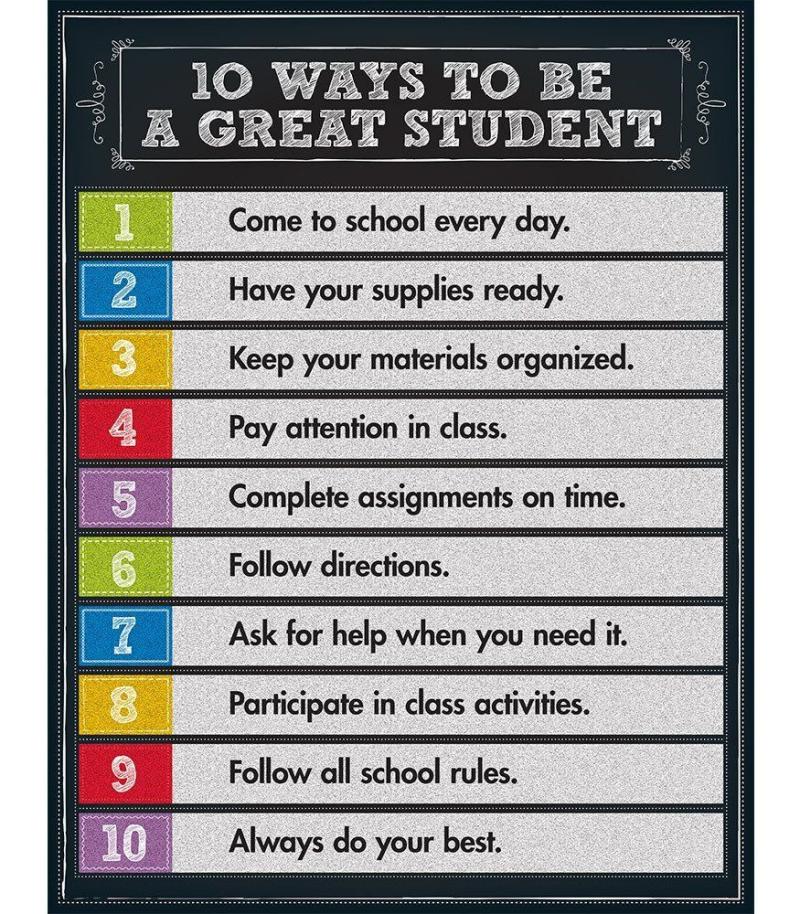How to be a good high school student?
Being a good high school student involves developing positive habits, traits, and strategies that support academic success and personal growth. Here are some tips to help you excel as a high school student:
Set Clear Goals:
- Define your academic and personal goals. Having clear objectives will motivate and guide your efforts.
Prioritize Time Management:
- Create a schedule that allows time for studying, attending classes, extracurricular activities, and personal downtime.
- Avoid procrastination by breaking tasks into manageable chunks and adhering to deadlines.
Active Engagement in Class:
- Participate in class discussions, ask questions, and take notes.
- Actively listen to your teachers and engage with the material to enhance your understanding.
Effective Study Habits:
- Develop efficient study habits, such as creating a dedicated study space, organizing your materials, and using effective note-taking techniques.
- Use active learning methods like summarization, self-testing, and teaching the material to others.
Stay Organized:
- Use planners or digital tools to keep track of assignments, tests, and deadlines.
- Maintain an organized backpack and workspace to minimize stress and ensure you have the necessary materials.
Seek Help When Needed:
- Don't hesitate to ask your teachers or classmates for help when you're struggling with a particular subject.
- Consider joining study groups to learn from peers and share knowledge.
Practice Critical Thinking:
- Develop critical thinking skills by analyzing, evaluating, and synthesizing information.
- Encourage independent thought and seek to understand the "why" behind the concepts you learn.
Effective Communication:
- Communicate with your teachers, parents, and peers in a respectful and open manner.
- Express your questions and concerns clearly and constructively.
Balanced Extracurricular Activities:
- Engage in extracurricular activities that interest you, but maintain a balance between academics and extracurricular commitments.
- Prioritize activities that align with your goals and values.
Healthy Lifestyle:
- Get enough sleep, eat a balanced diet, and engage in regular physical activity to support your overall well-being.
- Manage stress through relaxation techniques, mindfulness, or hobbies you enjoy.
Responsible Use of Technology:
- Use technology wisely for academic purposes and minimize distractions during study time.
- Be cautious about screen time and the impact of social media on your well-being.
Respect and Collaboration:
- Treat your peers, teachers, and school staff with respect and kindness.
- Foster positive relationships and collaborate with classmates on group projects and assignments.
Set Realistic Expectations:
- Strive for excellence, but also acknowledge that it's okay to make mistakes and learn from them.
- Don't compare yourself to others; focus on your personal growth.
Continuous Learning:
- Cultivate a growth mindset and embrace challenges as opportunities for learning and improvement.
- Stay curious and pursue knowledge beyond the classroom.
Reflect and Adapt:
- Regularly assess your progress and adapt your strategies based on your experiences and outcomes.
Being a good high school student is about more than just academics; it's about personal development and learning valuable life skills. By cultivating these habits and traits, you'll not only excel in high school but also prepare yourself for future success in your educational and professional endeavors.
Strategies for Thriving as a High School Student
High school is a crucial period of growth, both academically and personally. Navigating this stage can be challenging, but with the right strategies, students can thrive and set themselves up for success in their future endeavors. Here are some key strategies for thriving as a high school student:
Set Clear Goals and Expectations: Establish clear academic, personal, and extracurricular goals for yourself. Having defined objectives will provide direction and motivation.
Develop Effective Time Management Skills: Create a realistic schedule that balances schoolwork, extracurricular activities, and personal time. Learn to prioritize tasks and manage your time effectively.
Prioritize Academic Success: Dedicate time for regular study sessions and complete assignments promptly. Engage with the material actively, seek help when needed, and maintain a positive attitude towards learning.
Explore Extracurricular Activities: Participate in activities that align with your interests and passions. Extracurricular involvement can provide leadership opportunities, personal growth, and valuable social connections.
Build Strong Relationships: Cultivate positive relationships with teachers, peers, and mentors. These connections can provide support, guidance, and opportunities for personal and intellectual growth.
Practice Self-Care: Prioritize your physical and mental health. Maintain a healthy diet, get regular exercise, and get enough sleep. Manage stress effectively through relaxation techniques and mindfulness practices.
Embrace Challenges and Setbacks: View challenges as opportunities for growth and learning. Don't be discouraged by setbacks; instead, use them to reflect, adapt, and improve your strategies.
Seek Guidance and Support: Don't hesitate to seek help from teachers, counselors, or parents when facing difficulties. Their guidance and support can help you overcome obstacles and make informed decisions.
Develop Self-Advocacy Skills: Learn to communicate your needs, concerns, and opinions effectively. Self-advocacy is an essential skill for navigating high school and beyond.
Celebrate Your Accomplishments: Recognize and celebrate your achievements, both big and small. Positive reinforcement can boost your confidence and motivation.
Tips for Excelling Academically and Socially in High School
To excel academically and socially in high school, consider these specific tips:
Attend classes regularly and participate actively: Actively participate in class discussions, ask questions, and take detailed notes to enhance comprehension and retention.
Establish strong study habits: Find a quiet study environment, create a study schedule, and utilize effective study techniques such as summarizing key points, creating mind maps, and practicing active recall.
Build rapport with teachers: Show respect for your teachers, seek their guidance when needed, and actively engage with their teaching methods.
Connect with classmates: Form study groups, participate in extracurricular activities together, and socialize with classmates to build friendships and support networks.
Contribute to the school community: Volunteer for school events, participate in clubs or sports teams, and represent your school in competitions or events.
Seek out mentors: Identify individuals who can provide guidance, support, and inspiration in areas that align with your interests and goals.
Manage stress effectively: Practice stress-reduction techniques such as meditation, yoga, or physical exercise to maintain a healthy balance between academics and personal life.
Develop a growth mindset: Embrace challenges as opportunities for learning and growth. View setbacks as learning experiences and persist in the face of difficulties.
Maintain a positive attitude: Approach your high school experience with a positive outlook. Believe in your abilities, celebrate your accomplishments, and maintain a sense of purpose.
Characteristics of a Successful High School Student
Successful high school students exhibit a combination of academic proficiency, personal growth, and social awareness. They demonstrate:
Strong Academic Performance: They maintain a high GPA, complete assignments on time, and demonstrate a deep understanding of the material.
Effective Time Management Skills: They balance academic work, extracurricular activities, and personal time effectively, prioritizing tasks and meeting deadlines.
Intrinsic Motivation: They are driven by a genuine interest in learning, seeking challenges and opportunities to expand their knowledge and skills.
Effective Communication Skills: They communicate clearly, both verbally and in writing, expressing their ideas and opinions with confidence and respect.
Collaboration and Teamwork: They work effectively with others, contributing to group projects and supporting their classmates.
Problem-Solving and Critical Thinking Skills: They can analyze situations, identify solutions, and make informed decisions.
Resilience and Adaptability: They bounce back from setbacks, learn from challenges, and adapt to new situations effectively.
Self-Awareness and Emotional Intelligence: They understand their strengths and weaknesses, manage their emotions effectively, and empathize with others.
Leadership Qualities: They take initiative, inspire others, and












